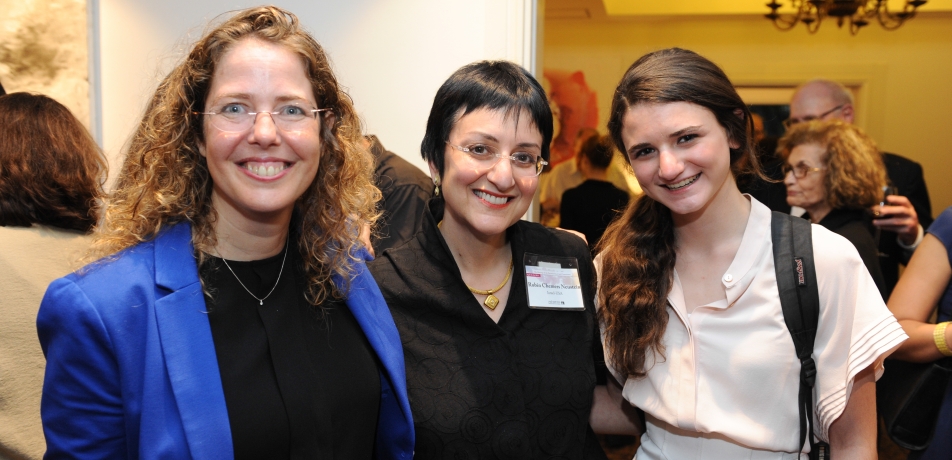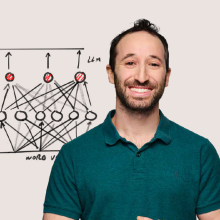Robin Chemers Neustein and Prof. Nirit Dudovich
People behind the science

Prof. Nirit Dudovich with Robin Chemers Neustein and her daughter.
An ultrafast connection—that’s a good way to describe the relationship between Prof. Nirit Dudovich and Robin Chemers Neustein. Prof. Dudovich, a member of the Department of Physics of Complex Systems, is advancing the field of “ultrafast light” to capture atoms and molecules in action.
Last year, Mrs. Neustein established the Robin Chemers Neustein Chair with Prof. Dudovich as the first incumbent.
Mrs. Neustein initially established a career development chair for Prof. Dudovich, then raised her giving level to a professorial chair “to honor Nirit upon her promotion in November,” Mrs. Neustein says. Upon her promotion, Prof. Dudovich became the Weizmann Institute’s first female professor in the Faculty of Physics.
Mrs. Neustein frequently targets her philanthropy to outstanding female research scientists. She became acquainted with the Weizmann Institute through her Rockefeller University co-trustee, D. Ronald Daniel. Mr. Daniel chairs the investment committee of Weizmann Global Endowment Management (W-GEM). He recruited Mrs. Neustein to join the committee when he learned she would be going to Israel in 2010 for her daughter to attend ninth grade.
“Trusteeship service at Rockefeller sparked my interest in scientific research”, says Mrs. Neustein, a Senior Director at Goldman Sachs. At Rockefeller, she endowed the chair held by neurobiologist Dr. Leslie Vosshall, renowned for her contributions in the field of olfaction. More recently, she endowed Rockefeller’s Laboratory of Mammalian Cell Biology and Development directed by the cell biologist Dr. Elaine Fuchs. At Mount Sinai Medical School, she endowed a postdoctoral fellowship for female research scientists.
The Neustein family’s year in Israel turned into four years—for her daughter to complete high school—and Mrs. Neustein commuted back and forth to New York. During these years, she became more involved with the Weizmann Institute, joining the Executive Board and its Management Committee.
“Research scientists are some of the most entrepreneurial people I know,” she says. “They think up new and important questions, write a plan, get it funded, hire staff, work hard for information, and then get the results out there. They are among the best start-up people on Earth.”
Fast friendship
In establishing the professorial chair, Mrs. Neustein wanted the incumbent to be a female research scientist. “I read and heard about Nirit‘s accomplishments in fast physics. Endowing a chair for Prof. Dudovich felt like an amazing opportunity to provide support for a creative scientist early in her career.” Mrs. Neustein, together with her daughter, researched Prof. Dudovich’s work and visited her lab.
Prof. Dudovich works on generating and applying ultra-short pulses of laser-produced light to probe extremely fast processes in nature, atoms, and molecules. Using these light bursts, she hopes to capture snapshots of things never before seen by the human eye - electron dynamics in atomic and molecular systems, which are at the heart of chemical and physical reactions. A tool for scientific investigation, and a better understanding of light and manipulating light, could have an impact on a variety of scientific fields.
“I made an immediate connection with Robin and am particularly inspired by the fact she ‘broke the glass ceiling’ in her career, as a woman in a senior position in the male-dominated field of investment banking,” says Prof. Dudovich. “Also, her devotion to Israel and her understanding of the importance of basic science are ways in which we connect, and I look forward to a long friendship with Robin and updating her on my progress.”
“Nirit is extremely personable as well as being an outstanding scientist, says Mrs. Neustein.” She is inquisitive, super-creative and dedicated both to the Institute and to Israel as her home. Her attachment to Israel is meaningful to me and my husband and daughter, because we have become very attached to Israel. We have established a home here too.”
So why women? The choice to invest in women scientists originates in the need for science “to have freedom to ask all the questions and get the broadest perspective, and that requires making sure that you pull in both genders,” she says. “And the untapped gender is women. This endowment gift reflects two generations of female philanthropy, mother and daughter, choosing to invest in a female scientist. Women funding women.”
“The leadership at the Weizmann Institute recognizes that, worldwide, there are relatively few women scientists, and that Israel is a small country reliant on human talent to drive its economy.” The Institute, she says, “has tackled the challenge” by running the National Postdoctoral Program for Advancing Women in Science, a nationwide fellowship program, which provides financial support to outstanding female science and math PhD graduates from all Israeli institutions of higher learning.
It turns out that Mrs. Neustein’s connection to the Institute transcends her focus on outstanding female scientists. Her own brother attended a high school program on campus in the 1970s. In addition, she always wondered about her own family’s connection to Dr. Chaim Weizmann: Her father’s family, Chemerinsky, traces back to the tiny town of Motol in Belarus, birthplace of Israel’s first President and the Founder of the Weizmann Institute, whose mother was a Chemerinsky.
“The Weizmann Institute is the part of Israel that feels most like home to me,” she says. “Science on a world-class level, a spirit of free inquiry and academic freedom, and worldly, open-minded people committed to new discovery and to bringing up new generations of scientists. Scientists at the Institute understand and have reverence for history, have an attachment to the country, and work hard for the benefit of humanity.”
Prof. Nirit Dudovich is funded by Crown Photonics Center, Jay Smith and Laura Rapp Laboratory for Research in the Physics of Complex Systems, Irving I. Moskowitz Foundation, The Wolfson Family Charitable Trust, Jacques and Charlotte Wolf Research Fund, The Enoch Foundation, Friends of the Weizmann Institute in memory of Richard Kronstein, European Research Council. Prof. Dudovich is the incumbent of the Robin Chemers Neustein Professorial Chair.








